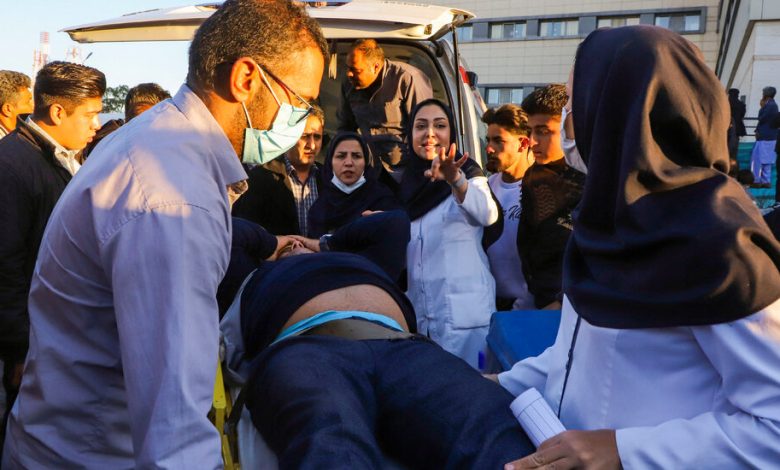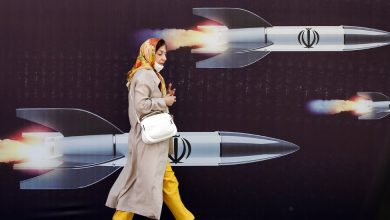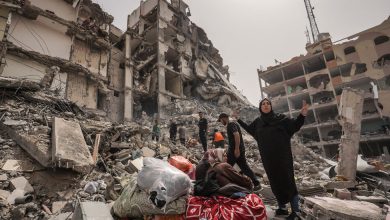Attacks Heighten Fears of a Wider War for the Middle East and U.S.

American, Israeli and Lebanese officials insist that few parties want Israel’s war in Gaza to become a wider conflict that engulfs the Middle East.
But the assassination of a top leader of Hamas in Lebanon on Tuesday, and the deaths of scores of people in mysterious twin explosions in Iran on Wednesday, threatened to bring the Middle East — and the United States — closer to the brink of a regional war, which the Biden administration has tried to stave off since Hamas’s deadly attacks against Israel on Oct. 7.
Just hours after the bombs went off in Iran, the United States and 11 of its allies issued a written warning to another militia group in the region, the Houthis of Yemen, who have been mounting near-daily missile, drone and seaborne attacks on commercial vessels.
So far the United States has held back from retaliating against Houthi bases in Yemen, in large part because it does not want to undermine a fragile truce in Yemen’s civil war.
But now Biden officials are signaling that their patience is running out.
“Let our message now be clear: We call for the immediate end of these illegal attacks and release of unlawfully detained vessels and crews,” White House officials said in a statement issued on Wednesday, a day after the shipping giant Maersk announced it would pause operations in the Red Sea.
“The Houthis,” the statement continued, “will bear the responsibility of the consequences should they continue to threaten lives, the global economy, and free flow of commerce in the region’s critical waterways.”
The warning — also signed by Britain, Australia, New Zealand, Bahrain, Belgium, Canada, Germany, Denmark, Italy, Japan, Singapore and the Netherlands — stopped short of threatening military strikes. Over the weekend, the U.S. Navy sank three Houthi boats, killing all the crew members, when they fired on American helicopters coming to aid a Maersk cargo ship.
On Monday, Iran’s navy announced the deployment of a flotilla of warships to the waterway. On the same day, Foreign Minister Hossein Amir-Abdollahian of Iran expressed “gratitude and appreciation” to a Houthi official visiting Tehran for the group’s support for Hamas, the government-run IRNA news agency reported.
A senior Iranian official said dispatching the warships, which join an Iranian spy ship already in the region, was meant to signal that Iran is supporting the Houthis and to raise the stakes. But the official said Iran has no plans for the warships to engage in a confrontation with U.S. naval vessels in the waterway.
President Biden has said he wants to avoid direct military attacks on the Houthis to avoid escalating a Middle East conflict.
“We remain incredibly concerned, as we have been from the outset of this conflict, about the risk of the conflict spreading into other fronts,” Matthew Miller, a State Department spokesman, told reporters on Wednesday.
Hezbollah, the powerful Lebanese militant group, has pledged that Tuesday’s killing of Saleh Al-Arouri, the Hamas leader, in a Beirut suburb, would not pass without a response. A key ally to Hamas, Hezbollah exercises de facto control over Beirut’s southern suburbs where the explosion occurred and has been engaged in escalating clashes with Israeli forces for months.
The circumstances surrounding the blasts at a memorial for Iran’s former general, Qassim Suleimani, in Kerman, Iran, were murkier. While Iran was quick to blame Israel, European and American officials said they doubted that the Israelis conducted the strike: Most of their actions against Iran have been highly targeted, from taking out the chief architect of Iran’s nuclear program to blowing up specific nuclear and missile facilities.
Three senior American officials and one senior European official said on Wednesday that the Islamic State or another terrorist group was a possible perpetrator. While there is some intelligence that points to Islamic State involvement in the attack, the officials cautioned the assessment is preliminary and no final conclusions have been drawn.
“It is entirely possible that one of the Israeli proxy groups let an attack get out of hand,” Ray Takeyh, a senior fellow at the Council on Foreign Relations who writes often about Iran, said on Wednesday.
Ayatollah Ali Khamenei, Iran’s supreme leader, issued a statement on Wednesday blaming the attack on the nation’s “malicious and criminal enemies,” but stopped short of naming any group or country. Mr. Khamenei vowed that Iran’s enemies should know that “this tragedy will have a strong response.”
Two people familiar with Iran’s internal discussions said that the ayatollah had instructed Iranian military commanders to pursue “strategic patience” and avoid getting Iran into a direct military confrontation with the United States.

Two bombs exploded along the road near the burial site of Qassim Suleimani, Iran’s former top general, during a commemoration on the fourth anniversary of his assassination by the United States.CreditCredit…Tasnim News Agency via Storyful
Several American officials said it was too soon to predict whether any kind of wider war would erupt. Israel, the officials said, would not have struck Mr. Al-Arouri without some belief that they could do so without escalating the conflict on the Lebanon border. But with the explosions, whatever the cause, coming so quickly after the assassination, there was little doubt that the risk of a spreading conflict was once more front of mind in the United States and Europe.
Israeli officials would not comment on whether their forces had targeted Mr. Al-Arouri, but Lebanese and American officials ascribed the attack to Israel.
In the wake of the strike, Biden administration officials made plans to step up diplomatic efforts with officials in Lebanon as part of an effort to pressure Hezbollah not to escalate the conflict. In coming days, Secretary of State Antony J. Blinken is expected to travel to the Middle East, where containing potential escalation will be one of his foremost goals.
“The chances of a regional war in the Middle East go up from 15 percent to as high as 30 percent,” said retired Adm. James Stavridis, the former NATO commander. “Still relatively low, but higher than before, and certainly uncomfortably high.”
But Biden administration officials and Middle East analysts noted that while Hezbollah and Iran have engaged in skirmishes and proxy attacks against Israel, they are not necessarily eager to widen the conflict.
“Throughout the devastation in Gaza, Hezbollah has maintained that they will engage in a limited way to pin down some Israeli forces,” Paul Salem, the president of the Middle East Institute, said in an interview. “It’s been crystal clear that they are not joining the fight directly.”
He and other analysts said that while Iran has helped plan and orchestrate some of the attacks taking place in the Middle East — including the Houthi’s missile attacks on shipping in the Red Sea — it has not taken on the United States or Israel directly.
Mr. Biden and his top aides have sought since the Oct. 7 attacks to contain the conflict between Israel and Hamas to the Gaza Strip. The Pentagon dispatched two aircraft carriers and doubled the number of American warplanes to the Middle East to deter Iran and its proxies in Lebanon, Yemen, Syria and Iraq from widening the war. Now that strategy is fraying. One of those carrier groups, led by the Gerald R. Ford, is leaving the area, the Pentagon said this week.
Iran-backed militia have attacked U.S. troops stationed in Iraq and Syria for counterterrorism duties 118 times since the Oct. 7 attacks, most recently on Monday. Several U.S. service members have been injured in the strikes, at least one critically, prompting the Pentagon to retaliate five times with airstrikes against the groups.
In recent weeks, the Biden administration declassified intelligence indicating that Iranian paramilitary groups were coordinating the Houthi attacks, providing targeting information about commercial shipping passing through the waterway and the Suez Canal. Israel is heavily dependent on Red Sea shipping traffic.
In response to the attacks, the United States has created a multinational naval task force to protect commercial ships in both the Red Sea and the Gulf of Aden.
Pentagon officials have worked up detailed plans for striking missile and drone bases in Yemen, and some of the facilities where fast boats of the kind used to attack the Maersk container ship appear to be tied up. But there is concern that such strikes would play into Iran’s strategy to bog down Israel and its allies on multiple fronts.
But the most serious threat to containing the Gaza conflict burst onto the scene Tuesday with the assassination of Mr. Al-Arouri.
“The loss of someone so intimately involved in both tactical operations and strategic diplomacy is a serious setback for Hamas,” Hanin Ghaddar and Matthew Levitt wrote in an analysis for the Washington Institute for Near East Policy. “What remains to be seen is how the group’s allies, especially Hezbollah, react to the attack.”
Western leaders sought to tamp down the fast-rising tensions. President Emmanuel Macron of France said shortly after the strike that it was “essential to avoid any escalatory attitude, particularly in Lebanon.”
In a phone call with Benny Gantz, an opponent of Prime Minister Benjamin Netanyahu of Israel who has joined the country’s wartime unity government, Mr. Macron said that “France would continue to pass on these messages to all players directly or indirectly involved in the area,” according to a summary of the call from the French presidency.
Farnaz Fassihi in New York and Michael Crowley in Washington contributed reporting.



